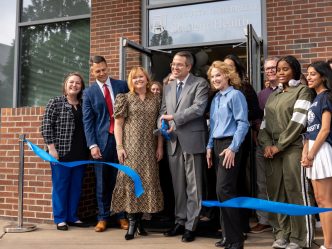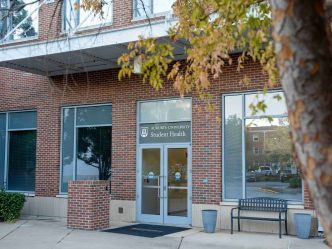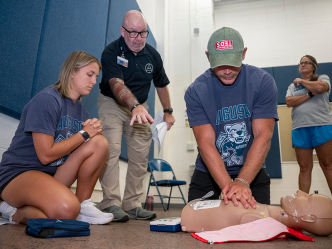Suicide is a growing problem across Georgia, and the ongoing social distancing measures that at times include both isolation and infrequent contact with others due to COVID-19 are only adding to it.
According to the Georgia Department of Behavioral Health and Developmental Disabilities, suicide was the 10th-leading cause of death in Georgia in 2017. Since 2018, suicide rates have increased in every state across the nation, except Nevada. In the most recent years, suicide has increased at greater percentages than any disease, to include heart disease, diabetes, stroke, kidney failure, etc.
University System of Georgia Chancellor Steve Wrigley said in a USG Mental Health Initiative news release that mental health challenges are on the rise throughout the state and the university system and its institutions have a burden to address these and lessen how they affect students.
With these concerns in mind, on Jan. 25, the Medical College of Georgia at Augusta University — along with Student Health and Student Counseling and Psychological Services — will roll out a new prevention program, named Kognito, designed to address these challenges. Kognito is a training program for all students, staff, and faculty to assess and assist with self-identifying if they are in need of help and to provide guidance in identifying those who may be at risk. Kognito provides education to all on how to recognize and assist someone who may be in crisis and/or in need of mental health resources.
“In speaking to students and some other people who have gone through similar situations and come through on the other side, when we talk about some of the resources that are available, we hear over and over, ‘I didn’t know that,’” said Dr. Martha Tingen, principal investigator of “Choose Life,” a suicide prevention project funded by the Georgia Department of Behavioral Health and Developmental Disabilities (DBHDD).
“So this is an opportunity for everyone to become more informed on what are the risk factors for self-harm, do you personally have them and may be at risk, recognize them in someone else who may at risk, what resources are available, and how to connect someone to these resources,” Tingen said. “Our goals are for everyone to recognize the signs of potential self-harm, when someone is at risk, offer hope, connect with any needed resources, and prevent suicide.”
The “Choose Life” project focuses on decreasing the stigma of sharing with others when you need help, suicide prevention, intervention for those who have attempted to prevent another attempt, and postvention (for those who have experienced the loss of a loved one) resources within Richmond County and Jones County.
Kognito, funded by the Georgia DBHDD, is a component of “Choose Life” and presents a unique training opportunity that allows the user to role-play interacting with virtual students. These students may be dealing with problems like anxiety or depression or other challenges. A virtual coach provides feedback on the interaction and provides suggestions, as well as offers recommendations for self-care. The program can assess issues the user may be struggling with as well.
Augusta University is an institutional member of the JED Foundation, a national nonprofit that provides programs aimed to prevent and increase awareness of suicide in young adults.
“Kognito allows AU to enhance existing training programs regarding suicide prevention, which can be expanded easily for possibly other mental health issues,” said Dr. Robert Dollinger, director of Student Health Services and the Augusta University representative to the USG Chancellor’s Mental Health Task Force. It also complements our existing Jags Live Well initiative.
The rollout of Kognito received approval from the Office of the Provost, both recent retiree Dr. Gretchen Caughman and former interim Dr. Zach Kelehear, and is fully funded by the “Choose Life” prevention project. Kognito at AU is a collaborative effort among the “Choose Life” Principal Investigator, Dr. Martha Tingen, and Co-Investigator, Dr. Marlo Vernon; Dr. Robert Dollinger, Director of AU’s Student Health Services; Dr. Elena Petrova, Director of AU’s Student Counseling and Psychological Services and Dr. Lacy Till, Staff Psychologist and Suicide Prevention Coordinator at AU; and Ms. Gina Thurman, AU’s Associate Dean of Students and Director of Student Advocacy.
More information, as well as links to these resources, will be emailed to students, staff, and faculty beginning Jan. 25, near the start of the 2021 spring semester.
For additional information, contact Drs. Robert Dollinger, Elena Petrova, Martha Tingen or Marlo Vernon.
 Augusta University
Augusta University




